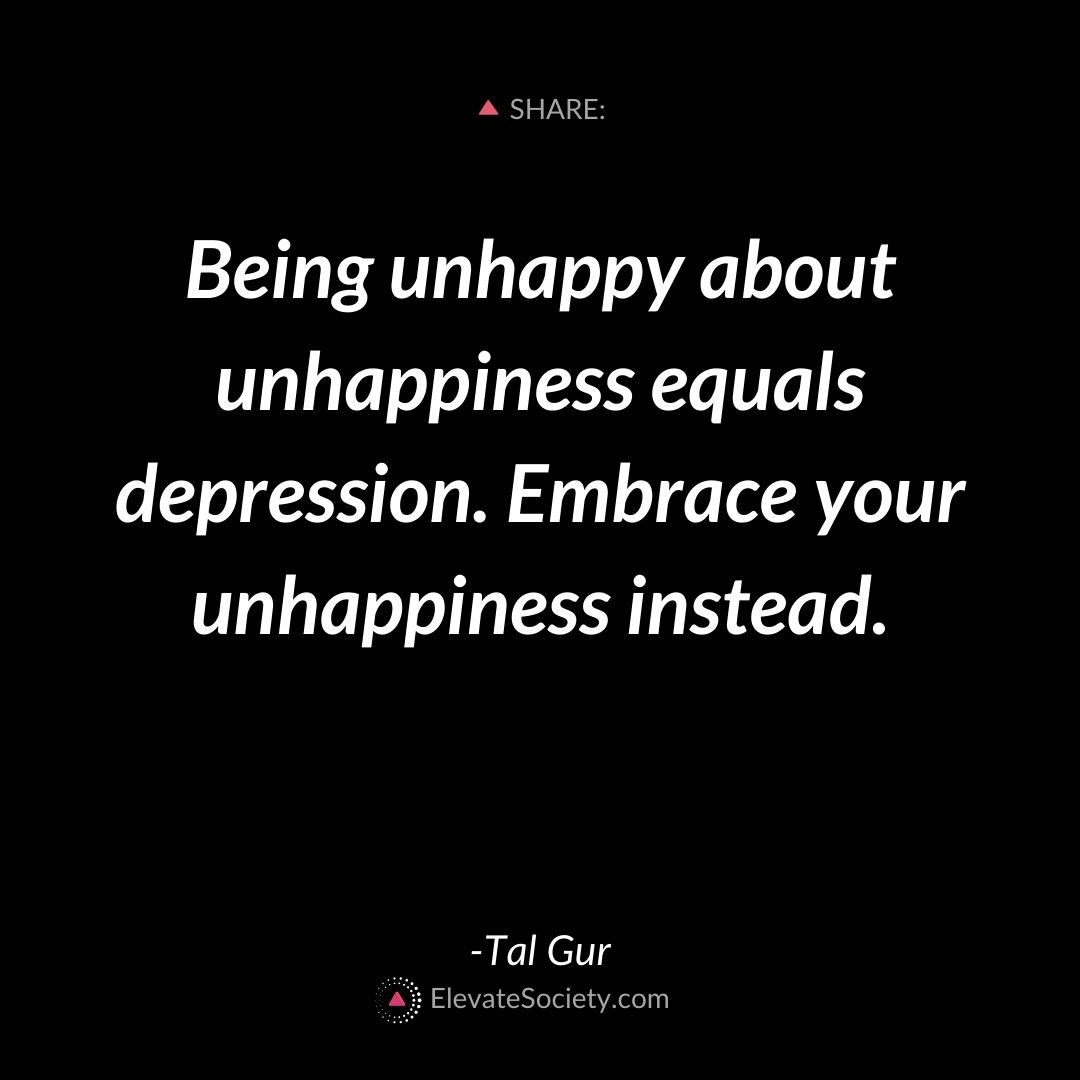Being unhappy about unhappiness equals depression. Embrace your unhappiness instead.
At first glance, this quote may seem like a simple encouragement to acknowledge our unhappiness and take action. However, beneath its surface lies a profound insight into the nature of depression and the power we possess to transform our lives.
Depression is not merely a state of being unhappy. It encompasses something deeper—a profound dissatisfaction with our own unhappiness. In other words, it is the act of lamenting our own sorrow, wallowing in a seemingly endless cycle of despair. It is a state where we become trapped within the confines of our own negative emotions, unable to break free.
But why does this distinction matter? It matters because understanding this difference can offer a new perspective—a gateway to liberation from the grips of depression. Rather than being consumed by our unhappiness, we are urged to acknowledge it instead. This means recognizing the existence of our pain, giving it space, and validating its presence in our lives. It is an act of self-compassion—a crucial step towards healing.
By acknowledging our unhappiness, we create an opportunity for self-reflection and self-awareness. We begin to explore the roots of our discontent, understanding its underlying causes and triggers. This process allows us to gain clarity, as we identify the areas in our lives that are causing distress or dissatisfaction. It empowers us to take ownership of our emotional well-being and take control of our narrative.
However, the transformative power lies not only in acknowledgment but also in utilizing our unhappiness as a catalyst for change. Rather than succumbing to the weight of despair, we can channel our discontent into fuel for action. Our unhappiness becomes a driving force, propelling us to seek improvement, growth, and ultimately, a better future.
This perspective encourages us to view unhappiness not as an insurmountable obstacle, but as a catalyst for personal development. It teaches us to view adversity as an opportunity—a chance to make positive changes and pursue a life aligned with our values and aspirations. Instead of becoming overwhelmed by negativity, we can harness the energy generated by our unhappiness to fuel meaningful action.
In essence, this quote challenges us to shift our mindset—to view unhappiness as a springboard rather than an abyss. It invites us to embrace our emotions, acknowledge their presence, and transform them into a source of motivation. By doing so, we can break free from the clutches of depression, paving the way for personal growth, resilience, and ultimately, a more fulfilling life.
Remember, within the realm of our unhappiness lies the power to shape our destiny. Let it ignite a fire within you—a fire that fuels your journey towards a brighter, more authentic, and deeply gratifying existence.
Is there a historical example that illustrates the message of the quote?
One of the most famous examples is Abraham Lincoln, the 16th president of the United States. Lincoln is renowned for leading the United States through the Civil War, one of the most significant crises in its history, and enacting the Emancipation Proclamation that ended slavery. However, Lincoln's life wasn't always marked by success. He faced numerous personal and professional setbacks and hardships, and it's well-documented that he suffered from what would likely be diagnosed today as depression.
He endured the death of his mother when he was just nine years old, lost his sister in his early twenties, and later lost two of his sons. Professionally, he failed in business and lost multiple elections before finally becoming President. These losses and failures led to periods of deep unhappiness and melancholy.
Despite his depression, Lincoln did not let unhappiness consume him. Instead, he acknowledged it and allowed it to motivate him. His experiences with personal loss and professional failure gave him a profound sense of empathy, which he used to relate to the hardships of the common people. His awareness of his own mental health struggles fostered his commitment to abolishing slavery, preserving the Union, and championing civil rights.
Lincoln's story is an excellent example of how acknowledging unhappiness, rather than being unhappy about unhappiness, can motivate into action. His perseverance in the face of adversity and depression, coupled with his commitment to change, shaped him into one of the most revered figures in American history.

* If you're looking for more inspiration to help you on your personal development journey, you may want to check out my extensive list of SMART goals. This page is packed with thousands of different goal ideas that can help you set new aspirations and reach higher heights in your life. Personally, this page helped me to create my own 100 life goals list, which I pursued for over a decade.
Chief Editor
 Tal Gur is an author, founder, and impact-driven entrepreneur at heart. After trading his daily grind for a life of his own daring design, he spent a decade pursuing 100 major life goals around the globe. His journey and most recent book, The Art of Fully Living, has led him to found Elevate Society.
Tal Gur is an author, founder, and impact-driven entrepreneur at heart. After trading his daily grind for a life of his own daring design, he spent a decade pursuing 100 major life goals around the globe. His journey and most recent book, The Art of Fully Living, has led him to found Elevate Society.



















